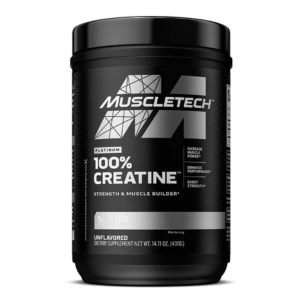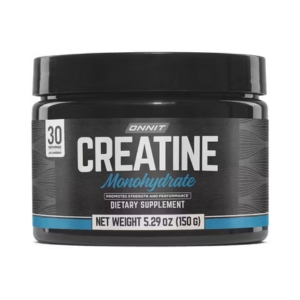 Expert's opinion
Expert's opinion
The article is a subjective view on this topic written by writers specializing in medical writing.
It may reflect on a personal journey surrounding struggles with an illness or medical condition, involve product comparisons, diet considerations, or other health-related opinions.
Although the view is entirely that of the writer, it is based on academic experiences and scientific research they have conducted; it is fact-checked by a team of degreed medical experts, and validated by sources attached to the article.
The numbers in parenthesis (1,2,3) will take you to clickable links to related scientific papers.
Best Creatine For Women 2024: Top 5 Supplements Reviews
All articles are produced independently. When you click our links for purchasing products, we earn an affiliate commission. Learn more about how we earn revenue by reading our advertise disclaimer.
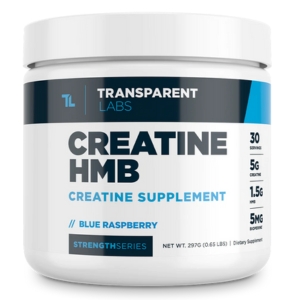
Transparent Labs Creatine HMB
- Contains hydroxymethyl butyrate (HMB) and vitamin D3
- Formulated with BioPerine® to enhance absorption and efficacy
- Contains no artificial sweeteners, colored dyes, unnecessary fillers, or harmful additives
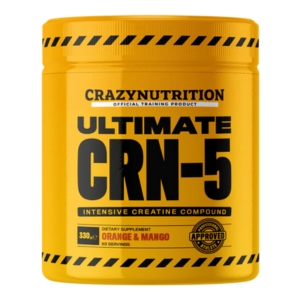
Crazy Nutrition Ultimate CRN-5 Intensive Creatine Compound
- Contains five different forms of creatine
- Optimizes muscle hydration
- Helps boost focus and endurance
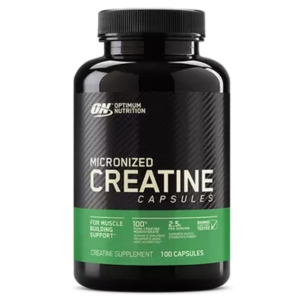
Optimum Nutrition Micronized Creatine Capsules
- Conveniently packed in capsules for those who are not a fan of powders
- Zero calories and zero carbs
- Supports muscle building and enhances performance
Dietary supplements exist in all shapes and forms, with some refilling your micronutrient deficiencies and others aiding in muscle building and weight loss. Creatine supplements are extremely popular nowadays, and what was once thought to be an ingredient only men use to build muscle is now getting a spike in interest among women.
Best Creatine Supplements For Women In (April. 2024)
- Transparent Labs Creatine HMB – Editor’s Choice
- Crazy Nutrition Ultimate CRN-5 Intensive Creatine Compound – Best Combination of Creatine Forms
- Optimum Nutrition Micronized Creatine Capsules – Best in Pill Form
- MuscleTech Platinum 100% Creatine – Best Clinically Backed Creatine
- Onnit Creatine Monohydrate – Best Vegan
5 Best Creatine For Women In 2024
Transparent Labs Creatine HMB
A great creatine powder formula for muscle growth and enhancing performance that’s made without any artificial ingredients or colorings.
- Contains hydroxyl-methyl butyrate (HMB) and vitamin D3
- Formulated with BioPerine® to enhance absorption and efficacy
- Contains no colored dyes, artificial sweeteners, harmful additives, or unnecessary fillers
- Expensive
Transparent Labs Creatine powder is made with a unique formula of ingredients and it includes HMB, a substance that’s thought to help[1] increase strength, lean body mass, aerobic capacity, and muscle recovery in those on an exercise program. Combined with creatine, it forms a synergistic, powerful energy-boosting creatine powder that can only increase its overall efficiency.
The formula also contains Vitamin D, which is a great addition since 50% of the global[2] population is Vitamin D deficient. BioPerine, or piperine, is known to increase[3] bioavailability and absorption.
The brand is well known for its high-quality products and third-party testing that ensures the potency and purity of its ingredients. One scoop contains five grams of creatine and 1.5 grams of HMB, and it comes in seven delicious flavors.
The only downside of this creatine supplement is its price, but they do offer a 60-day money-back guarantee if the formula doesn’t sit well with your digestive system.
Crazy Nutrition Ultimate CRN-5 Intensive Creatine Compound
A premium creatine dietary supplement formula consisting of five different creatine forms for ultimate lean muscle gain and fitness performance.
- Contains five different forms of creatine
- Optimizes muscle hydration
- Helps boost focus and endurance
- Expensive, but they offer a discount on bundles
- Comes in only one flavor
- Contains an artificial sweetener, sucralose
Crazy Nutrition’s Ultimate CRN-5 Intensive Creatine Compound has an incredible formula of five different high-octane creatines that prevent developing potential creatine tolerance. It also comes with premium electrolytes that optimize muscle hydration and maximize your workouts.
Some creatine brands require you to cycle creatine, meaning you take it only on days when you work out, but Crazy Nutrition’s creatine can safely be taken as a daily supplement, so you never have to worry about cycling again.
Crazy Nutrition’s Creatine product contains a controversial ingredient, sucralose, known to alter gut microbiota adversely and to increase blood sugar if consumed along with a source of carbohydrates. The Food and Drug Administration has approved controversial ingredients, but evidence exists for these products that show they may cause adverse effects in some people.
One scoop contains six grams of creatine, and it helps intensify workouts, maximize strength, gain muscle mass, increase focus, preserve lean muscle mass, and support a speedy recovery. The product is on the expensive side, but they do offer a money-back guarantee as well as discounted bundles if you choose to buy more than one tub. Unfortunately, it comes only in one flavor: mango-orange, so if you’re not a fan of the taste, you might look for another brand of creatine.
Optimum Nutrition Micronized Creatine Capsules
If you’re someone who seems to forget to take creatine powder to the gym, Optimum Nutrition Micronized Creatine Monohydrate Capsules are perfect for you. They’re convenient to take with meals so you never forget to supplement.
- Conveniently packed in capsules for those who are not a fan of creatine powder forms
- Zero calories and zero carbs
- Supports muscle building and enhances performance
- Expensive
- You have to take four pills, so that might be a lot for someone who doesn’t like pills
Optimum Nutrition Micronized Creatine Monohydrate Capsules contain 2.5 grams of pure creatine monohydrate powder per serving, and although the serving size is four capsules, you can simply take them with food. The formula does not require you to take it immediately after your workout, which makes it easier not to forget to take it.
Their creatine monohydrate helps support muscle building, performance, and endurance, and for quality and purity assurance, the product has been third-party tested by Informed Choice and produced in facilities that meet current good manufacturing practices (GMP) standards.
MuscleTech Platinum 100% Creatine
An amazing and affordable creatine powder for women that comes unflavored and makes it easy for you to mix it in whatever type of liquid you want. It’s one of the best pure creatine supplements on the market.
- 100% pure micronized creatine monohydrate
- Affordable
- Clinically proven that it delivers creatine directly to your muscles
- Can often be out of stock
MuscleTech Platinum 100% creatine has 5 grams of high-quality micronized creatine per serving which is shown to increase lean mass, help you lose weight, and improve your overall strength and endurance. The formula is designed to act as a phosphate donor pool for your hard-working muscles, which allows you to train harder for longer. It’s unflavored creatine, so you can mix it up with any liquid of choice.MuscleTech likes to point out the data on creatine and report studies[4] that showcase how using creatine can cause a six lbs to increase in muscle gain in six weeks, as well as how using creatine chelate may cause an increase[5] in muscle performance strength in only ten days using just 2.5 g creatine per day.
Onnit Creatine Monohydrate
A great vegan creatine monohydrate that helps enhance performance, improve muscle mass, and aid in the regeneration of ATP.
- Third-party tested for purity, potency, and banned substances and bears the Informed-Sport logo
- Vegan
- Affordable
- Sometimes takes a while to ship
Onnit Creatine Monohydrate is a high-quality creatine powder that promotes strength and power, supports lean muscle gains, and aids changes in body composition. It’s dairy-free and therefore suitable for vegans, making it different from most other creatine powders on the market.
Onnit Creatine Monohydrate is third-party tested and bears the seal of the Informed Sports logo, which means it was also rigorously tested for banned substances. The serving size of this creatine powder is 5 grams of micronized creatine monohydrate, and it makes for a great pre or post-workout supplement. Just mix it with water, and you’re good to go!
What Is Creatine?
Creatine is an organic compound that naturally exists in your body and acts as an energy source[6] for your muscles. That’s why it’s an amazing supplement for those trying to build muscle, as it helps to maintain a continuous supply of energy to hard-working muscles.
It’s naturally occurring in animal products, so those with a carnivorous diet generally do not need extra creatine. Vegans, vegetarians, and those with a predominantly plant-based diet have a lower intake and sometimes need creatine supplementation.
Creatine exists in a few different forms, but research suggests that creatine monohydrate is the most effective[7]. It allows your muscles to produce more energy during physical exercise by helping increase muscle creatine and concentrations of phosphocreatine.
How To Choose A Creatine Supplement?
When choosing a creatine supplement, you should always consider the following:
- Potency and purity – when a brand has its products third-party tested, that is usually a great sign of their high quality, potency, and purity. It also makes their higher price point a bit easier to take since you know you’re at least getting good value for your money.
- Form of creatine – unless you’re taking the Crazy Nutrition Ultimate CRN-5 Intensive Creatine Compound that has a formula of five different forms of creatine, make sure the brand you’re using has creatine monohydrate instead of creatine ethyl ester or creatine hydrochloride (HCL) as it’s proven to be the most effective form[8] for muscle building, improving performance, and increasing recovery.
- A power-packed formula – if you’re interested in more than just pure creatine monohydrate, choose a brand with a formula that enhances creatine’s performance even more and adds additional ingredients that can help with your endurance, muscle health, strength, and athletic performance, as well as your overall fitness.
- Product form – you can choose a powder or capsules, depending on your preference. Keep in mind that creatine supplements in capsules or pills usually require you to take multiple pills a day, so if you’re not a fan of swallowing pills, you might be better off with a powder.
- Other creatine supplements – sometimes, you’ll see other supplements that contain creatine, and it’s only due to the serving size that you decide whether or not you’re still going to get the pure creatine monohydrate to reach your daily goals
How To Take Creatine Supplements?
Most of the creatine supplements on the market come in powder form, but some brands offer pills or capsules. In any case, first-time users are usually recommended to start with the so-called loading phase, which leads to a quick increase[9] in muscle stores of creatine. This usually means taking 20 grams per day for about a week, split into four five-gram servings throughout the day. Take them with water or any other clear liquid.
You can take it pre-workout or post-workout, and you’re not required to take it with meals, but there is some evidence that proves how taking creatine with a protein, or carb-based meal may increase its absorption due to insulin release[10]. However, you don’t have to participate in creatine loading and may choose to go for a slower, gradual uptake of creatine. In this case, you should be taking around 3-5 grams per day which equates to one scoop for most products.
Benefits Of Creatine For Women
There are plenty of benefits of creatine supplementation for women, with the most important being[11]:
- Improving exercise performance
- Promoting better and quicker recovery
- Increasing muscle mass and strength
- Increasing fat-free muscle mass during exercise
- Improving anaerobic capacity
Side Effects Of Taking Creatine
Even though it’s one of the most popular dietary supplements out there, some women stay away from taking creatine for fear they might gain weight, cause dehydration, cramping, and digestive problems, as well as potentially harm their liver and kidneys.
The International Society of Sports Nutrition deems creatine monohydrate to be safe for consumption due to plenty of research[12] that proves so. Many people connect specific side effects to creatine supplementation when in fact, it could be a combination of a myriad of things. Those looking to build muscle and improve their performance during intense gym sessions usually take more than just creatine, and these ingredients might be the culprit of their side effects.
A study that examined creatine’s potential to cause dehydration during exercise in hot weather showed no adverse effects[13] when compared to placebo, and another study[14] conducted in patients undergoing hemodialysis noted that creatine reduced muscle cramping incidents by 60%. So if anything, it seems that creatine prevents dehydration and muscle cramping, and not the other way around.
When it comes to weight gain claims, these are true[15] because with muscle-building comes a bit of water retention. Creatine may cause you to store more water in your muscles which may make your scale go up, especially in the first few weeks of use. It is extremely important to note that the weight gain isn’t due to fat gain[16] but only water retention.
And to tackle the kidney and liver claims, to this date, there is no evidence[17] that proves creatine supplementation damages the kidneys or the liver.
The Bottom Line
Creatine supplements for women are an incredible way of helping you increase your muscle mass and athletic performance, improve muscle recovery, prevent lean muscle loss, and enhance your focus while you’re exercising.
By no means do you have to use a creatine supplement, but if you’re working hard in the gym and noticing barely any results, you might try out one of these great, high-quality brands and see if they’ll give you the energy boost you need to increase your muscle strength, improve your recovery, and become an overall better athlete.
Frequently Asked Questions
Yes, there is no reason why women shouldn’t be taking creatine, as it may only help them increase their lean muscle mass, improve their performance, and aid in recovery.
The best form of creatine is creatine monohydrate, so you should always look for products that contain it. Even if the product has other forms of creatine, make sure that the monohydrate is predominant.
Creatine supplementation has been shown to help women build and preserve lean muscle mass and help sustain higher energy levels throughout more intense workouts like high-intensity interval training (HIIT), resistance training, or sprints.
There is no difference between dosages for men and women. Unless you’re creatine loading, which generally means you’re taking around 20 grams of creatine per day, the usual serving size is three to five grams per day. This is more than enough to promote muscle growth, improve muscle strength, and support recovery. The typical scoop size is 7 g.
+ 17 sources
Health Canal avoids using tertiary references. We have strict sourcing guidelines and rely on peer-reviewed studies, academic researches from medical associations and institutions. To ensure the accuracy of articles in Health Canal, you can read more about the editorial process here
- Kreider, R.B., Kalman, D.S., Antonio, J., Ziegenfuss, T.N., Wildman, R., Collins, R., Candow, D.G., Kleiner, S.M., Almada, A.L. and Lopez, H.L. (2017). International Society of Sports Nutrition position stand: safety and efficacy of creatine supplementation in exercise, sport, and medicine. Journal of the International Society of Sports Nutrition, [online] 14(1). doi:10.1186/s12970-017-0173-z.
- Holeček, M. (2017). Beta-hydroxy-beta-methylbutyrate supplementation and skeletal muscle in healthy and muscle-wasting conditions. Journal of Cachexia, Sarcopenia and Muscle, [online] 8(4), pp.529–541. doi:10.1002/jcsm.12208.
- van Schoor, N. and Lips, P. (2017). Global Overview of Vitamin D Status. Endocrinology and Metabolism Clinics of North America, [online] 46(4), pp.845–870. doi:10.1016/j.ecl.2017.07.002.
- Fernández-Lázaro, D., Mielgo-Ayuso, J., Córdova Martínez, A. and Seco-Calvo, J. (2020). Iron and Physical Activity: Bioavailability Enhancers, Properties of Black Pepper (Bioperine®) and Potential Applications. Nutrients, [online] 12(6), p.1886. doi:10.3390/nu12061886.
- gilmerm (2021). Is Sucralose (Splenda) Bad for You? [online] Cleveland Clinic. Available at: https://health.clevelandclinic.org/is-sucralose-splenda-bad-for-you/.
- LWW. (2022). Effect of Oral Creatine Monohydrate and Creatine Phosphate… : The Journal of Strength & Conditioning Research. [online] Available at: https://journals.lww.com/nsca-jscr/abstract/1999/02000/effect_of_oral_creatine_monohydrate_and_creatine.1.aspx.
- Selsby, J.T., DiSilvestro, R.A. and Devor, S.T. (2004). Mg2+-Creatine Chelate and a Low-Dose Creatine Supplementation Regimen Improve Exercise Performance. The Journal of Strength and Conditioning Research, [online] 18(2), p.311. doi:10.1519/r-13072.1.
- Hall, M. and Trojian, T.H. (2013). Creatine Supplementation. Current Sports Medicine Reports, [online] 12(4), pp.240–244. doi:10.1249/jsr.0b013e31829cdff2.
- Buford, T.W., Kreider, R.B., Stout, J.R., Greenwood, M., Campbell, B., Spano, M., Ziegenfuss, T., Lopez, H., Landis, J. and Antonio, J. (2007). International Society of Sports Nutrition position stand: creatine supplementation and exercise. Journal of the International Society of Sports Nutrition, [online] 4(1). doi:10.1186/1550-2783-4-6.
- GREEN, A.L., SIMPSON, E.J., LITTLEWOOD, J.J., MACDONALD, I.A. and GREENHAFF, P.L. (1996). Carbohydrate ingestion augments creatine retention during creatine feeding in humans. Acta Physiologica Scandinavica, [online] 158(2), pp.195–202. doi:10.1046/j.1365-201x.1996.528300000.x.
- Jäger, R., Purpura, M., Shao, A., Inoue, T. and Kreider, R.B. (2011). Analysis of the efficacy, safety, and regulatory status of novel forms of creatine. Amino Acids, [online] 40(5), pp.1369–1383. doi:10.1007/s00726-011-0874-6.
- AL; (2020). Long-term creatine supplementation does not significantly affect clinical markers of health in athletes. Molecular and cellular biochemistry, [online] 244(1-2). Available at: https://pubmed.ncbi.nlm.nih.gov/12701816/.
- VOLEK, J.S., MAZZETTI, S.A., FARQUHAR, W.B., BARNES, B.R., G??MEZ, A.L. and KRAEMER, W.J. (2001). Physiological responses to short-term exercise in the heat after creatine loading. Medicine and Science in Sports and Exercise, [online] pp.1101–1108. doi:10.1097/00005768-200107000-00006.
- Chang, C.-T. . (2002). Creatine monohydrate treatment alleviates muscle cramps associated with haemodialysis. Nephrology Dialysis Transplantation, [online] 17(11), pp.1978–1981. doi:10.1093/ndt/17.11.1978.
- KREIDER, R.B., FERREIRA, M., WILSON, M., GRINDSTAFF, P., PLISK, S., REINARDY, J., CANTLER, E. and ALMADA, A.L. (1998). Effects of creatine supplementation on body composition, strength, and sprint performance. Medicine & Science in Sports & Exercise, [online] 30(1), pp.73–82. doi:10.1097/00005768-199801000-00011.
- Branch, J.D. (2003). Effect of Creatine Supplementation on Body Composition and Performance: A Meta-analysis. International Journal of Sport Nutrition and Exercise Metabolism, [online] 13(2), pp.198–226. doi:10.1123/ijsnem.13.2.198.
- Angelis, E. (2020). Is the use of oral creatine supplementation safe? The Journal of sports medicine and physical fitness, [online] 44(4). Available at: https://pubmed.ncbi.nlm.nih.gov/15758854/.

